
“We used to wait in the library in the evening until we could hear his key rattling in the latch of the front hall, and then rush out to greet him; and we would troop into his room while he was dressing, to stay there as long as we were permitted, eagerly examining anything which came out of his pockets which could be regarded as an attractive novelty. Every child has fixed in his memory various details which strike it as of grave importance. The trinkets he used to keep in a little box on his dressing-table we children always used to speak of as “treasures.” The word, and some of the trinkets themselves, passed on to the next generation. My own children, when small, used to troop into my room while I was dressing, and the gradually accumulating trinkets in the “ditty-box”—the gift of an enlisted man in the navy—always excited rapturous joy.” – Theodore Roosevelt
Growing up, one item that loomed large in my boyish imagination was a small wooden box my dad kept on top of his dresser. There was nothing really special about the box itself. What made the box an object of fascination was what my dad kept inside it.
The box was the place my dad stored all his little trinkets that he had gathered through the years: pocket knives, cufflinks, class rings, and tie bars are just some of the items he kept in the box. But to me and my brother, my dad’s knickknacks were more than mere trinkets. They were treasures.
It was always a treat when dad would bring his treasure box down from the dresser and let me and my brother explore the items. I was amazed how much stuff he was able to cram into such a small space. Even as a boy, I recognized that my dad’s treasures were pretty darn manly. The box even had the faint manly smell of metal and musk.
I’ve talked to other men who share a similar memory as mine. Just like Theodore Roosevelt, they can remember specific items from their father’s or grandfather’s “treasure box.”
My dad’s treasure box is still in the same place it’s always been for nearly 30 years. Last weekend I visited my folks and brought my camera along so I could take some pictures of my dad’s treasure box and share them on the site. Below I take you all on a photo tour of my dad’s treasure box. I also snapped some photos of my own burgeoning treasure collection.
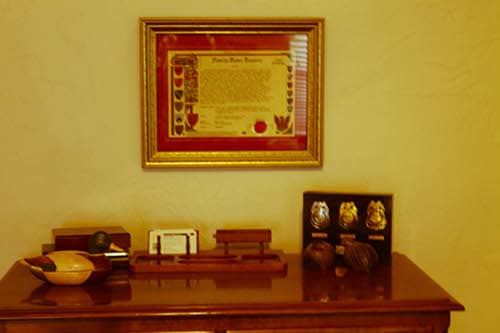
Top of my dad’s dresser.
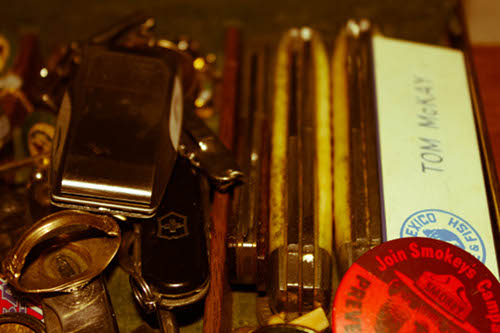
Close-up on various pocket knives and my dad’s New Mexico game warden name tag.

Shotgun tie bar.

I was obsessed with this tie chain as a kid. It’s a working replica of a foothold trap. You can set it and put your finger on the trigger and it will snap shut. I’ve seen something like this sold in truck stops marketed as “mosquito traps.” I thought it was the coolest thing in the world as a kid. Twenty years later, I still think it’s pretty darn awesome.
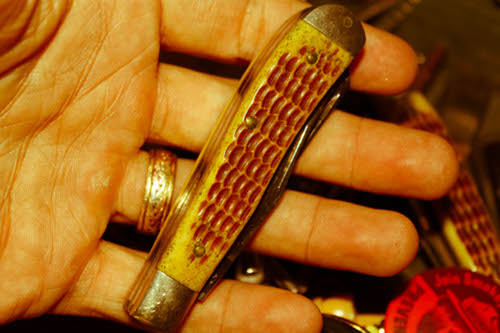
One of many pocket knives in my dad’s treasure box.

My dad has recently added another box where he says he keeps “the real treasures.” These are all his badges he’s collected over the years in his service to the U.S Fish & Wildlife Service.
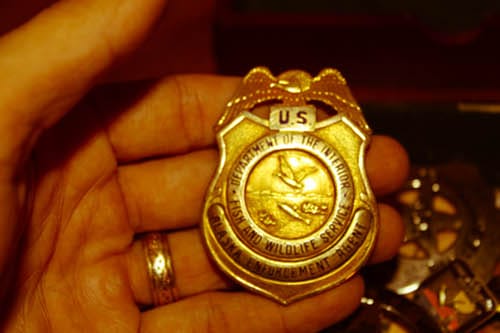
Fish & Wildlife badge when my dad did some work up in Alaska.
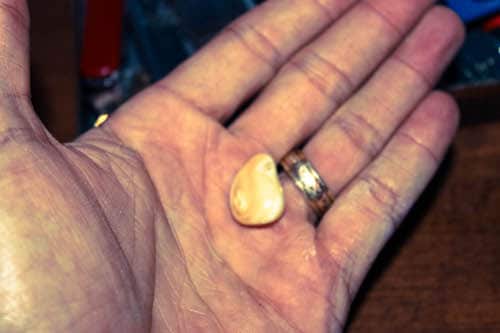
“Your readers who are hunters will know what this is,” my dad said. It’s an elk tooth, also known as elk ivory.
The Guardian of My Dad’s Treasure Box Since 1978: The Ceramic Mallard Soap-On-A-Rope Holder
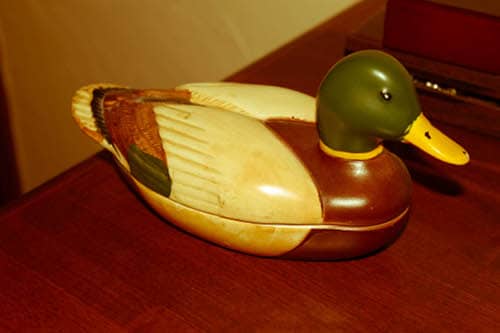
Containing a manly scented soap-on-a-rope, this ceramic mallard has sat atop my dad’s dresser, standing guard over his treasure box since 1978. Avon sold these back in the 70s. I know there’s got to be some older readers who got this awesomely manly soap dish as a Christmas present along with cologne in pheasant-shaped bottles. I always thought it was cool, manly, and distinguished as a kid. I will be fighting my brother over it when we settle my parents’ estate.
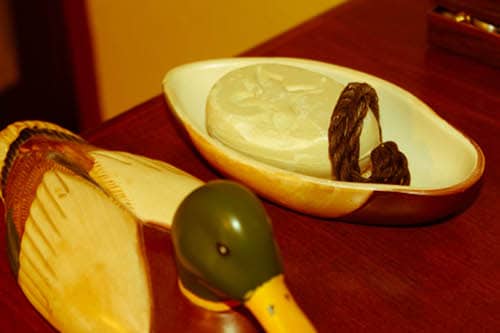
I don’t think my dad ever used the soap. It still smells great. Avon needs to re-issue these bad boys. I think they could sell a boatload of them for Christmas. I’m pretty sure Old Spice got their idea for the grizzly bear deodorant holder from this duck soap dish.
My Treasure Box

I’ve continued the tradition of keeping some “treasures” above my dresser. My dad gave me some of his treasures, to which I’ve added my own mementos. I’ve had several treasure boxes over the years, including old cigar boxes. Those are great man treasure boxes. Today I keep my trinkets in a wooden valet that I got for Christmas a few years ago. My collection is pretty paltry compared to my dad’s, but to be fair, he’s had a few more decades than me to build up his collection.
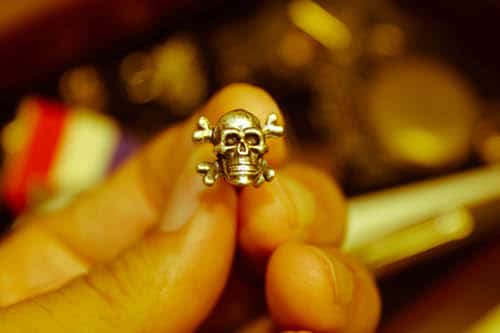
My memento mori cufflinks I wear to my monthly Freemason meetings.

This tie bar belonged to Kate’s grandfather. He passed away a couple of years ago, and Kate’s Nana gave it to me. It’s in the shape of the USS Indiana, the battleship he served on during WWII.
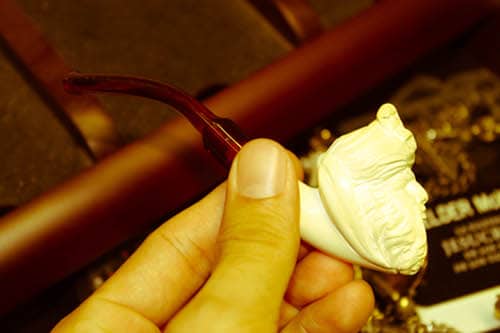
Several of the items in my box are things AoM readers have sent me over the years. Those are some of my favorites. One AoM reader sent me this handsome meerschaum pipe that’s in the shape of a pirate’s head. I don’t smoke, but it will forever hold a place in my box of manly treasures.
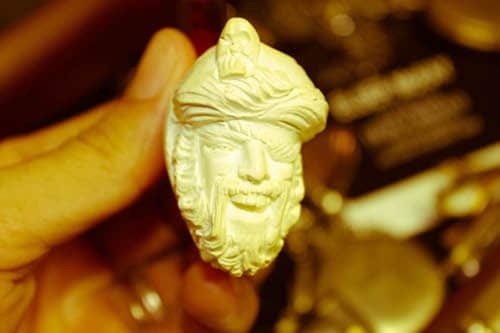
Front of the pirate’s head.
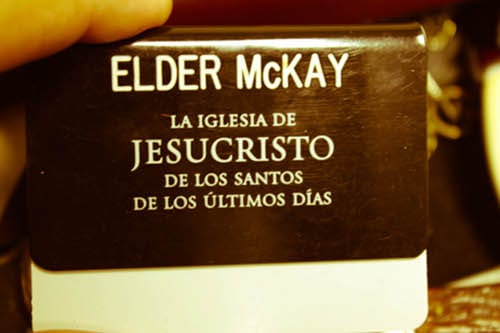
Some of you have probably noticed the Mormon missionary name tag nestled among my treasures. I served a Mormon mission when I was 19 in Tijuana, Mexico. My mission was a defining moment in my life and definitely a rite of passage into manliness for me, so the name tag definitely deserves a place in the box.
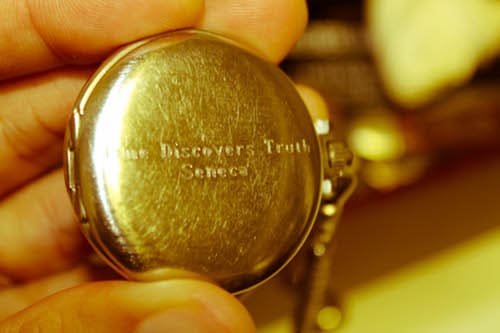
This is a pocket watch that two of my friends from high school gave me before I left for Tijuana. They engraved a quote from Seneca on one side: “Time discovers truth.” On the other side are their initials.

You’ve got to have pocket knives in your box of manly treasures. This one used to be in my dad’s, but now it’s in mine.

Douk Douk pocket knife the kind folks at Bench & Loom recently sent me.
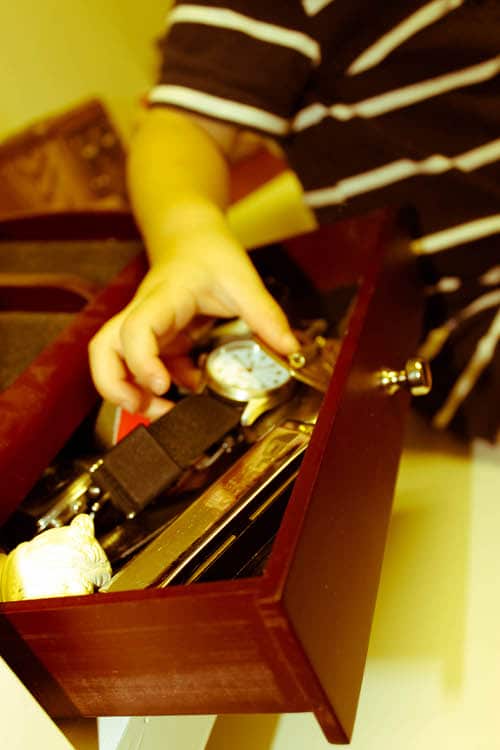
My almost two-year-old Gus is already interested in my treasure box. He likes to sit on top of my dresser and rummage though things. His favorite thing is the harmonica. He still doesn’t have it quite figured out yet. I’m looking forward to when he gets a bit older and I can share the stories behind the items, just like my dad did with me.
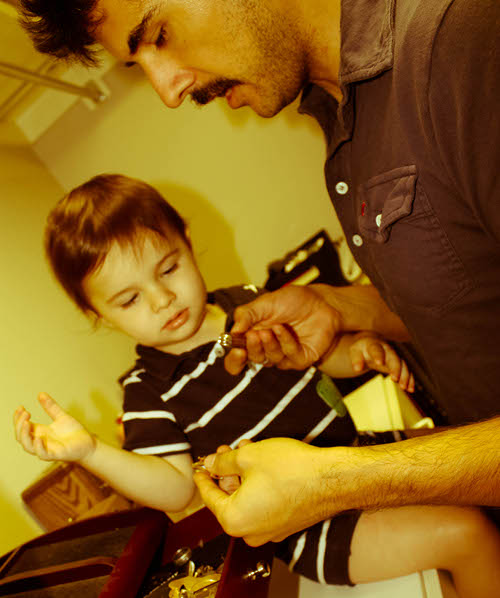
Showing Gus his Pop Pop’s old pocket knife. Just as my dad gave me some of his treasures to start my collection, one day I’ll give Gus some of mine so he can start his.
What’s in Your Treasure Box?
Who else out there has a box on their dresser that contains their manly “treasures?” What do you have in your box? Share with us in the comments.
Better yet, share a picture of your treasures with us. Take a picture of them and upload it to the AoM Community, or you can use Instagram and tag them with with @artofmanliness and #manlytreasures. I’m looking forward to learning about your man treasures!
If you don’t have a ditty-box for your manly treasures, start one today. It’s a great way to store your memories as well as those small assortments you use on a regular basis like tie bars and watches. It doesn’t have to be very fancy. Old cigar boxes are great for holding man treasures. (If you’re looking for a cigar box, pick up The Art of Manliness Collection. It’s both our books encased in a vintage inspired cigar box.) Or just pick up an inexpensive box from a craft store, like Hobby Lobby. Someday your kids will enjoy rummaging through your manly treasures and hearing the stories behind the interesting things you’ve picked up along life’s way!
No related posts.



Heading Out on Your Own — Day 6: How to Ace a Job Interview
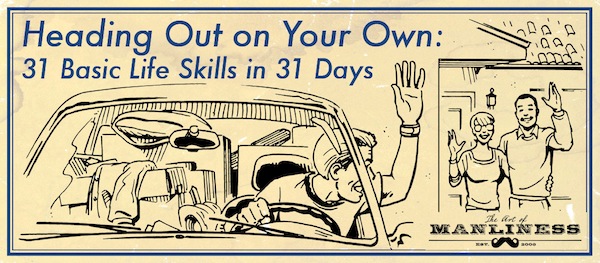
Nearly every man will go through at least one job interview at some point, maybe even several dozen over his lifetime. Even if you plan on becoming an entrepreneur and your own boss, many businesses start off as a side hustle to your 9-5 before becoming a full-time gig, and plenty of millionaires spent time in their younger years waiting tables and filing papers.
Knowing how to ace a job interview is a skill every man can master. There are numerous ways to hone that skill and special considerations for different kinds of interviews, and we’ll definitely cover those specific ins and outs down the road. But for this series, we present the most important basics for job interview success — these essentials work whether you’re applying for a job at a Pizza Hut or a law firm.

Clean-up your online presence. Many employers are using the internet to screen job applicants. And it’s not just big corporations that are doing this. I know a manager of a restaurant here in town that checks the Facebook account of people who submit applications. What are employers looking for? They’re looking for any red flags that indicate you might be a bad employee — pictures of you toking it up or funneling beer or status updates where you use excessively crude language or bad mouth a former or current employer will probably land your application in the trash.
We’ll be going into more detail about how to clean-up and manage your online reputation later this month. Stay tuned.
Have a list of references that your interviewer can actually call. Every job application you submit, whether for the local ice cream parlor or a fancy corporation, will probably ask for a list of references. While many hiring managers don’t actually call the references you give, in the off chance that they do, you want your references to be people that can honestly put in a good word for you. Before you list a person as a reference, shoot them an email if possible and ask if you can use them as a reference. That way, if they do get a call from an employer, they’ll be prepared and won’t be stammering to come up with something good to say about you, let alone remember who you were.
Research the employer. Know something about the company or business you’re applying for. First, you want to know that the job and working environment is a good fit for you. Second, you want to be prepared to answer questions like: “Why do you want to work here?” or “What do you know about our company?” Third, knowing a lot about the company will enable you to ask your own questions about the job, which is a key way to impress the interviewer (see below).
Know your resume and what you wrote down on your application. If you’re applying for a job that requires you to submit a resume, have everything you put in your resume down pat and be prepared to elaborate if asked. Same goes for anything you put on a job application. Be prepared to answer any questions about what you put down.
And it should go without saying, but be completely honest with what you put on your resume or application. I know one young woman in law school who put on her resume that she spoke Spanish fluently, which in reality meant she had taken three years of college Spanish and could sort of stumble through a very rudimentary conversation. Little did she know that the hiring attorney had lived in Spain for several years and spoke Spanish like a native. After a few minutes of questions, the hiring attorney started asking her questions in Spanish. She had no idea what he was saying. Needless to say, she didn’t get a second interview.
Dress appropriately. You want to put your best foot forward during your interview, and your appearance is a big part of that. It’s the first part of your first impression. You want to look presentable, well-groomed, and dressed appropriately for the type of job you’re applying for.
Just use some common sense when determining what to wear to the interview. I think a good general rule to follow is to dress one notch up from how people who already work there dress. So if you’re applying to a restaurant where the waiters wear jeans and t-shirts, wear khakis and a polo shirt to the interview. If you’re applying to a place where people wear khakis and polos, then wear a button-down shirt and khakis to the interview. If everyone wears khakis and button-down shirts, then do likewise, but add a sport coat and tie. You get the idea.
Here’s an article and a quick visual guide on how to dress for more professional jobs.
Be punctual. If you’re applying to a part-time wage job, one of the most important attributes an employer is looking for in an employee is reliability. Every employer will tell you…reliable people are hard to find! Employers want to know the people they hire will show up for the shift they’re assigned to, at the time they’re scheduled, and will come in ready to work. If you stroll into your interview late, what do you think that tells the employer? That you’ll likely be a tardy employee.
Practice the manly art of punctuality. Show up to the business 5-10 minutes early (more if it’s a professional job with a waiting area, less if it’s a casual job with no place for you to wait), let somebody know that you’re there for your interview, and wait until the manager is ready for you. If you’re running late because of an emergency, call the interviewer and let them know.
If the manager makes you wait, don’t act perturbed. That’s their prerogative. Just keep being your pleasant self. When the manager finally comes and gets you and apologizes for making you wait, act like it wasn’t a big deal at all, even if you had to wait 15 minutes. Of course, you should take into account a manager’s tardiness when determining if you’ll accept a job offer. Having an unreliable boss can make a job a pain.
Understand that the interview begins as soon as you walk through the door. As soon as you walk through the door, the interview has started. Assume that everyone you encounter before and after you even meet the person actually responsible for hiring will have a say in whether you get the job or not. And by everyone, I mean everyone: janitors, secretaries, hostesses, and customers included. Hiring managers often ask their subordinates what they thought of job applicants. If you were rude to the secretary or cold and aloof with the hostess at the restaurant, kiss your chances of landing the job goodbye. Treat everyone with the utmost respect and be your best self.
Shake hands, smile, and look the employer in the eye. Display confidence during your interview. As soon as you see the hiring manager walk towards you, stand up and walk towards her with a smile and an open hand. Give a firm handshake and say, “Nice to meet you!” Follow the hiring manager to where the interview will take place and don’t sit until she says, “Take a seat.”
Sit comfortably straight in your chair. Sit up straight, but comfortably straight. You don’t want to look like a robot. Don’t cross your arms in front of you — that makes you look defensive. Just rest them gently on your thighs. Don’t be afraid to gesture as you answer questions — it shows you’re excited. Avoid any nervous ticks like checking your watch, tapping your foot, or touching your face and hair.
Show excitement and interest. As someone who has been on the other side of the desk in conducting job interviews, nothing is worse than talking to someone who shows no interest or excitement about the job. All I’m thinking is: “Why am I wasting my time with this person who doesn’t even want to be here?” So cleaning bathrooms isn’t the most exciting job in the world. But if you want the job, you darn well better act like there’s nothing you’d rather do than clean bathrooms. Remember this: job interviews are a form of theater and everyone has a role to play. Your role is “eager job applicant who is ready to roll up his sleeves and get to work, even if the work isn’t all that glamorous.”
Keep answers brief (but not too brief). Don’t just give one word answers, but don’t keep blabbing on and on. Answers to most basic interview questions shouldn’t take more than a minute to answer.
Rehearse answers to common interview questions. Again, job interviews are a form of theater. Just as you’d rehearse your lines for a play, so too should you rehearse your lines for a job interview. There are plenty of sites with huge lists of common job interview questions. Print them off and rehearse them by yourself and with a friend in a mock interview. Below I highlight a few of the most common interview questions and offer some suggestions on how to answer them:
“Tell me about yourself.” I hate this question because it’s so incredibly broad. But interviewers like to ask it because it shows how you handle unstructured situations, so you might as well be ready for it. Whatever you do, don’t respond with: “What do you want to know?” Nor should you launch into your life story…”Well, I was born in McAllen, Texas, and I have a dog named Mabel…” Despite how the question is worded, employers don’t actually want to know about you — they want to know something about you that’s relevant to the open job. Tell them why you’re applying for this job and highlight any strengths that you’ll bring to the business. “I’m a freshman at the University of Oklahoma studying history. I worked as a waiter this summer in Edmond, and now that I’m living in Norman, I’m looking for another job waiting tables. I think I’ve got the kind of enthusiastic personality that would fit really well with your restaurant.”
“What are your strengths?” Pick two or three of your biggest strengths and have a few specific examples that offer a concrete and memorable demonstration of those qualities.
“What are your weaknesses?” Don’t say “I can’t think of any.” Don’t go the cliche “here’s a weakness that’s actually kind of a strength” route (“I’m too much of a perfectionist!”). And don’t overshare. This isn’t a time to confess your weird habits. Come up with one thing that isn’t a huge deal, and then — here’s the important part — explain what you’re doing to correct it. This is what employers are trying to get at with this question. They want to see if you’re self-aware enough to see deficiencies in yourself and that you’re able to take actions to correct them. So you might say, “I used to be really unorganized and scatter-brained. That was okay in high school, but this first semester in college my grades started to suffer. So I started studying about productivity and time management and now I plan my weeks and days out religiously. I’ve never been more on the ball.”
“I see you don’t have any experience in _____. Why do you think you would succeed in this position?” If this is the first job you’ve ever applied for or it’s a job in a field you have no experience in, this question can throw you for a loop. If you don’t have any experience in the position you’re applying, look for skills you’ve demonstrated in other areas of your life that can cross-over to the job. Have you done community service? Were you the captain of your cross-country team? Did you help plan the prom? Did you take care of your sick grandfather? Use experiences from all areas of your life to show you’re prepared for the job.
Have some questions for the interviewer ready. Interviewers usually finish things up by asking, “So do you have any questions for us?” The incorrect response is, “Nope! You answered all my questions.”
Always have some thoughtful questions ready to ask the hiring manager. Again, it shows that you’re interested in the job. Moreover, it demonstrates that you’re not a potato head and that you actually have the brain power to formulate a thoughtful question. Most importantly, it’s your chance to find out if the job really is a good fit for you.
Here are some possible questions to ask about the job:
- “What characteristics does your ideal employee have?”
- “What’s the culture like here?”
- “Why do people like to work here?
- “What’s the training like?”
- If you’re applying for a service job, ask whether the business experiences any “rushes” and how they handle them.
- “What’s the next step? When will you be making a decision? Can I follow up with you in a week?”
While you should definitely ask your interviewer questions, don’t ask a question that he already answered during the course of the interview. So, if the employer gave a rundown of your potential job duties at the beginning of the interview, don’t ask, “So what will I be doing here?” at the end of it. You just demonstrated that you suck at paying attention. Also avoid questions that make you look lazy or that might raise red flags; for example, “Um, do you do background checks?” or “How soon can I ask for time off?”
Thank the interviewer for their time. When the interview is finished, shake the interviewer’s hand, and thank him for his time. Make it sincere. Last impressions count nearly as much as first ones do. If it’s a more professional job, and one you really want, stick a thank you note in the mail the same day as the interview. Some folks say the thank you note is outdated these days and just to send an email the same day. But personally, if I got such an email, I’d think, “Yes, I know. You just thanked me a few hours ago.” An email is about on the same level as an in-person thank you, so it seems redundant. And most people get so much email, they really don’t look forward to more. They’ll forget about it in the time it takes to click delete. A hand-written note, on the other hand, is something different, requires more effort, and brings you up again in their memory a couple of days later in a positive way.
Any other general job interview tips for a young man just starting out life? Share them in the comments!
No related posts.




































0 comments:
Post a Comment